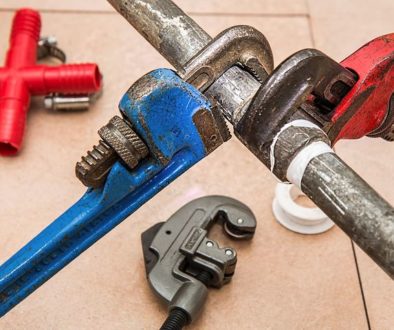No small business owner ever launched a venture in hopes that it’s going to crash and burn. That’s just not how we’re wired. That doesn’t mean, however, that it doesn’t happen, and that some advanced planning shouldn’t be considered.
In my experience, once the train goes off the rails, it’s probably too late to put into motion the 3 suggestions I’ve made below. That’s why it’s so imperative that you set them in motion well before you ever consider closing your door. There are some bad things that can happen if you default, so considering some proactive measures ahead of time is worth considering.
Keep Your House Out Of It

The really attractive feature of SBA loans is that the SBA is willing to lend to borrowers who don’t have sufficient collateral to cover the loan. Most other small business lenders will require that you pledged enough to cover the majority (if not all, and then some) of the loan balance.
With that said, the SBA requires lenders to take as much as collateral as they can. Business assets are a given, but in a liquidation situation, most business assets sell for 10% – 25% of their purchase price. This means that for business like health clubs and restaurants, the equipment you buy for $100,000 new will go for somewhere in the $10,000 – $25,000 range. Not surprisingly, this is almost always insufficient to cover the loan balance in a liquidation scenario.
After business assets, banks always take a look at real estate. For most people, this means the primary residence. The general idea is that if you default on your loan, they can sell the home to recover some (or all) of their funds. Having a home as collateral also give the bank control. You won’t be able to sell or refinance the home without the bank approving it.
At this point, you may be thinking “Ok, but if the SBA requires a lien on my home, how can I avoid it?”
Here’s the thing: the SBA won’t take a lien on your home if there is no equity in it. This means if you take a home equity loan immediately before you take your SBA loan, and it results in your business having less than 20% equity (I think, it might be 25%. Sorry, it’s been a while and I can’t find it anywhere online) you won’t have to pledge it as collateral.
While it’s true that a lender could still end up with a lien on your home if the lender obtains a judgement against you, then attaches a judgement lien (depends on the state), it’s my understanding that a bankruptcy could cut that off. And practically speaking, in my experience, judgement liens are not something most lenders pursue.
Leave Your Spouse Out of the Deal

If both you and your spouse each own 20% of the business, you are both likely going to be required to personally guarantee. There’s probably no getting around that.
On the flip side, if your spouse doesn’t own more than 20%, isn’t material to business operations, and has little into the way of personal income or assets, many lenders won’t require them to sign personal guarantees.
So why does it matter?
You just never how things are going to play out in life. Maybe your spouse gets a high paying job or inherits some money. By not personally guaranteeing the SBA loan, any assets or income that she accumulates will be safe if you default on your SBA loan.
From an Offer in Compromise perspective, having your spouse not guarantee can also be very beneficial. An OIC where your non-guaranteeing spouse is offering their income or assets towards your settlement can improve your odds of success.
Why? Because according the SBA’s Form 1150 (the Offer in Compromise form), a settlement offer should bear a reasonable relationship to the amount recoverable through enforced collection.
If the spouse that guaranteed the SBA loan has limited assets, but the non-guaranteeing spouse has income or assets, then when the non-guaranteeing spouse offers up their income or assets (in addition to the guaranteeing spouse offering their income and assets), it would result in an offer the exceeds the amount recoverable through enforced collection.
One final reason you want to avoid a spousal guarantee is in the event that a guarantor is forced to file for personal bankruptcy. While it’s not ideal to file for personal bankruptcy, having one spouse who didn’t file can help with future borrowing needs.
Don’t Bet What You Aren’t Willing to Lose

I listen to a lot of podcasts about entrepreneurship (How I Built This, The Pitch, and Startup, to name a few). In many cases, you hear a similar story emerge:
“I invested my entire life’s savings into the business. I was sleeping in my car, or on my friend’s couch. We didn’t know where the next dollar was coming from. We maxed out our personal credit cards. The business was 24 hours away from complete and utter implosion.”
These narratives make for compelling listening, for sure. But I also feel like it does the average entrepreneur a disservice. Please hear me loud and clear: not every business venture needs to be a high wire act! Coming close to the edge of disaster shouldn’t be the goal. Sure, it makes for a good story, but putting it all on the line for your venture can also be a disaster.
The Blackjack Analogy
When it comes to business ventures, I take a similar approach that casinos advocate for gambling: only gamble what you can afford to lose. And just to add to that, I say place small bets instead of one huge bet.
In case you aren’t exactly following my analogy, here’s an example:
If I go to the casino and sit down at the Blackjack table, I generally will say “ok, I’ll lose up to $100 tonight, and after that I’m done.” Why do I do that? Because I understand that this activity is inherently risky, and I don’t want to get carried away and lose everything in one night. Same deal with a business venture. When I tinker with a business idea, I set a budget that will allow me to first test the idea. If the market feedback isn’t so stellar, I don’t invest any more. Why continue to bet if the cards just aren’t going your way?
Also, when I play blackjack, I don’t bet my entire night’s budget on a single hand. Why? Because if that one hand doesn’t work out, my night it over. And that brings me to my final point: if you put everything you have into a business venture and it doesn’t work out, it’s “night over” financially speaking.
Rather than close your eyes and bet it all, I’d recommend placing small bets on business ideas. I can’t do it justice, but it’s a concept that I first learned about in the book “The Lean Startup”. The whole idea is to use data and feedback to build your business rather than just blindly throwing money into a business based on gut feelings are assumptions.

